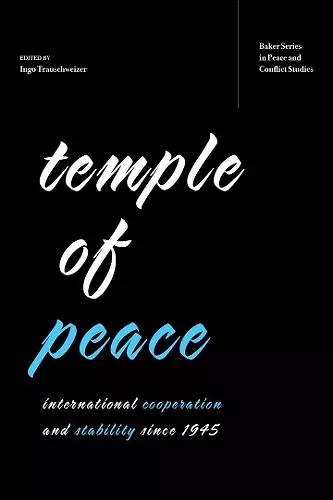Temple of Peace
International Cooperation and Stability since 1945
Format:Hardback
Publisher:Ohio University Press
Published:19th Mar '21
Currently unavailable, and unfortunately no date known when it will be back
This hardback is available in another edition too:
- Paperback£20.99(9780821424933)

The often-violent realities of international relations in the post–World War II era have challenged Winston Churchill’s characterization of the United Nations as a “temple of peace.” In this volume, nine experts examine the modern history of international relations in order to shed light on their prospective futures.
This collection raises timely questions about peace and stability as it interrogates the past and present status of international relations.
The post–World War II liberal international order, upheld by organizations such as the United Nations, the North Atlantic Treaty Organization, and similar alliances, aspired to ensure decades of collective security, economic stability, and the rule of law. All of this was a negotiated process that required compromise—and yet it did not make for a peaceful world.
When Winston Churchill referred to the UN framework as “the temple of peace” in his famous 1946 Iron Curtain speech, he maintained that international alliances could help provide necessary stability so free people could prosper, both economically and politically. Though the pillars of international order remain in place today, in a world defined as much by populism as protest, leaders in the United States no longer seem inclined to serve as the indispensable power in an alliance framework that is built on shared values, human rights, and an admixture of hard and soft power.
In this book, nine scholars and practitioners of diplomacy explore both the successes and the flaws of international cooperation over the past seventy years. Collectively, the authors seek to address questions about how the liberal international order was built and what challenges it has faced, as well as to offer perspectives on what could be lost in a post-American world.
“As the consensus around global institutions and alliances shatters around us, this marvelous volume is a timely intervention. Trauschweizer gathers a stellar team of historians to recover the forces that produced the postwar liberal international order and to help us understand the structural and ideational challenges it faces today.”
“An optimistic volume that concludes it is quite premature to talk about the imminent demise of the liberal postwar order. Anyone with a serious interest in global affairs will benefit from reading these inspiring contributions.”
“At a time when the value of international organizations, including the United Nations and NATO, is increasingly questioned, the contributors present stimulating, balanced and insightful accounts of the limits and possibilities of international cooperation. A must-read for everyone who is curious about the past, present, and future of the liberal international order.”
ISBN: 9780821424407
Dimensions: unknown
Weight: unknown
242 pages